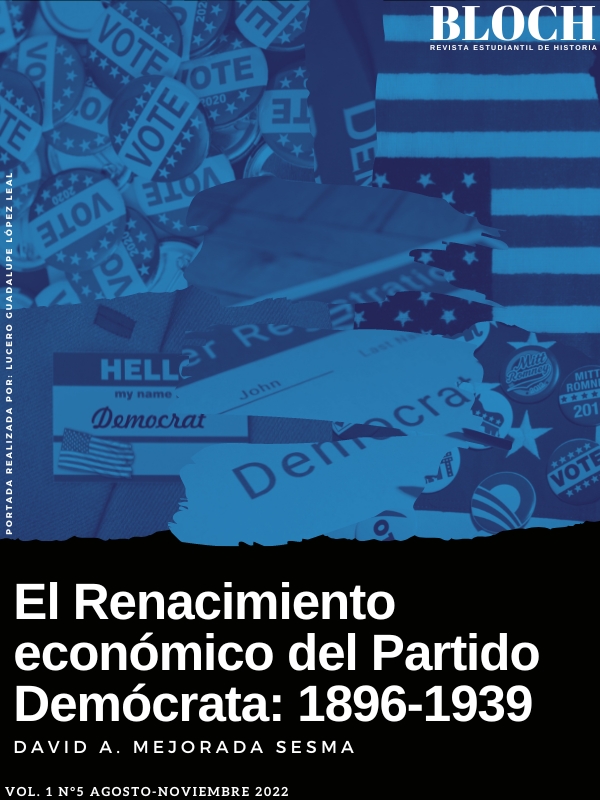
Publicado 2022-11-28
Palabras clave
- Partido Demócrata; Era Progresista; Economía; New Deal; Progresismo.
Cómo citar
Derechos de autor 2022 David A. Mejorada Sesma

Esta obra está bajo una licencia internacional Creative Commons Atribución 4.0.
Resumen
El texto aborda el proceso de transformación de las posturas económicas del Partido Demócrata entre los años de 1896 y 1939. El período abordado, si bien es corto, es rico en el proceso de transformación ideológica del partido pues los eventos sucedidos en estos años obligarán al partido a adaptarse a los cambios nacionales e internacionales. El abordar los cambios en las posturas económicas de ambos partidos tiene un cierto grado de complejidad pues es necesario no solo conocer el contexto histórico de la época, sino también comprender los trasfondos culturales para poder comprender el tema en su totalidad, es por esto que en el texto también se aborda un poco el contexto histórico y cultural de la época y cómo este moldeó e influenció en los cambios que se exponen en el documento. Los periodos históricos del trabajo son la Era Progresista, la Primera Guerra Mundial, el Período entreguerras, los Felices años veinte y la Gran Depresión.
Descargas
Citas
- Aneja, Abhay y Guo Xu. “The Costs of Employment Segregation: Evidence from the Federal Government under Wilson”. (California: IRLE Working Paper No. 108-20, 2020). http://irle.berkeley.edu/files/2020/12/The-Costs-of-Employment-Segregation.pdf
- Burkel, Nicholas C. "After Wilson: The Struggle for the Democratic Party, 1920–1934" History: Review of New Books 22, no. 2 (1994). doi: 10.1080/03612759.1994.9948855
- Conover, Pamela Johnston, y Stanley Feldman. "The Origins and Meaning of Liberal/Conservative Self-Identifications." American Journal of Political Science 25, no. 4 (1981): 617-45. doi:10.2307/2110756.
- Craig, Douglas B. Progressives at War: William G. McAdoo and Newton D. Baker, 1863-1941. Baltimore, The John Hopkins University Press, 2013. https://muse.jhu.edu/book/22248/pdf
- Drutman, Lee. "The Two-Party System Broke the Constitution." The Atlantic, 2 de enero de 2020. https://www.theatlantic.com/ideas/archive/2020/01/two-party-system-broke-constitution/604213/ (Consultado el 19-5-2021)
- Gelman, Andrew. "The Twentieth-Century Reversal: How Did the Republican States Switch to the Democrats and Vice Versa?" Statistics and Public Policy 1, no. 1 (2014): 1-5. doi: 10.1080/2330443X.2013.856147
- Gould, Lewis L. "1912 Republican Convention." Smithsonian Magazine, agosto de 2008. https://www.smithsonianmag.com/history/1912-republican-convention-855607/ (Consultado el 20-5-2021)
- Janda, Kenneth, Jeffrey M. Berry y Jerry Goldman. The Challenge of Democracy: American Government in Global Politics. Boston: Cengage Learning, 2010.
- Ladd, Everett Carll. "The Shifting Party Coalitions--From the 1930s to the 1970s," California State University Long Beach. https://web.csulb.edu/~astevens/posc420/files/ladd.html (Consultado el 21-5-2021)
- Oliver, Robert T. "The speech that established Roosevelt's reputation" Quarterly Journal of Speech 31, no. 3 (1945): 274-282. doi: 10.1080/00335634509381097
- Rauchway, Eric. "When and (to an extent) why did the parties switch places?". The Chronicle of Higher Education, 20 de mayo de 2010. http://chronicle.com/blognetwork/edgeofthewest/2010/05/20/when-and-to-an-extent-why-did-the-parties-switch-places/ (Consultado el 20-5-2021)
- Robinson, Edgar E. The Presidential Vote 1896-1932. Stanford: Stanford University Press, 1934.
- Sagredo Santos, Antonia. "El abandono del modelo liberal durante el new deal rooseveltiano," En Historia 396 3, no. 2 (2013): 299-331.
- Sternsher, Bernard. "The Emergence of the New Deal Party System: A Problem in Historical Analysis of Voter Behavior." En The Journal of Interdisciplinary History 6, no. 1 (1975): 127-49. doi:10.2307/202828.
- Walker, Larry. "Woodrow Wilson, Progressive Reform, and Public Administration." Political Science Quarterly 104, no. 3 (1989): 509-25. doi:10.2307/2151276.
- Williams, R. Hal. Realigning America: McKinley, Bryan, and the Remarkable Election of 1896. Lawrence: University Press of Kansas, 2010.
